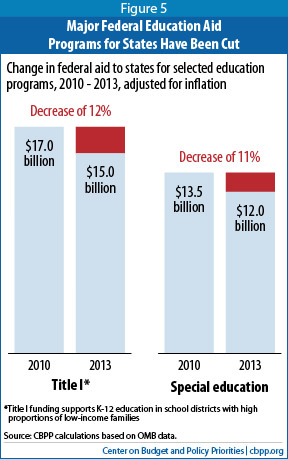Another Win for the Koch Brothers: Underfunded Public Schools
The American working and middle classes aren’t the only sectors still suffering the effects of the Great Recession. Public schools have yet to regain their economic footing, either. That fits in perfectly with the dreams the Koch brothers-backed American Legislative Exchange Council has of dismantling the system, and democracy itself.
American public schools still receive less annual per-student funding from state budgets than they did before the onset of the Great Recession, a significant lag with worrisome consequences for a system already facing performance pressure from political and policy leaders, according to a new report by the Center on Budget and Policy Priorities.
“Restoring school funding should be an urgent priority,” the study advised. Though with anti-spending conservatives controlling half the nation’s state legislatures, reversing that trend doesn’t seem likely — especially as the Koch brothers-backed American Legislative Exchange Council continues to buy such significant influence.
The reduced levels reflect not only the lingering effects of the 2007-09 recession but also continued austerity in many states; indeed, despite some improvements in overall state revenues, schools in around a third of states are entering the new school year with less state funding than they had last year. At a time when states and the nation are trying to produce workers with the skills to master new technologies and adapt to the complexities of a global economy, this decline in state educational investment is cause for concern.
The impacts are significant as most localities are unable to replace the lost state revenues with local taxes. That means fewer resources for schools, larger class sizes and a significant hit to local economies after school districts cut some 324,000 positions. “These job losses have reduced the purchasing power of workers’ families, in turn reducing overall economic consumption, and thus deepened the recession and slowed the pace of recovery,” the report says.
But the bigger risk is to the nation’s economic future.
Many states and school districts have undertaken important school reform initiatives to prepare children better for the future, but deep funding cuts hamper their ability to implement many of these reforms. At a time when producing workers with high-level technical and analytical skills is increasingly important to a country’s prosperity, large cuts in funding for basic education threaten to undermine the nation’s economic future.
Part of the problem is a reduction in federal aid to states, which then gets passed on to the local schools. But the core issue is funding priorities at the state level, and the persistence of the recession itself, which while technically over, has left stubbornly high unemployment and underemployment, and less money in consumers’ pockets, putting a drag on state tax revenues.
That means that yes, we can blame Wall Street — and globalization — for some of this. And, of course, ALEC, which is warping public spending priorities as it works at systematically dismantling public education.
—Posted by Scott Martelle.
Your support matters…Independent journalism is under threat and overshadowed by heavily funded mainstream media.
You can help level the playing field. Become a member.
Your tax-deductible contribution keeps us digging beneath the headlines to give you thought-provoking, investigative reporting and analysis that unearths what's really happening- without compromise.
Give today to support our courageous, independent journalists.




You need to be a supporter to comment.
There are currently no responses to this article.
Be the first to respond.